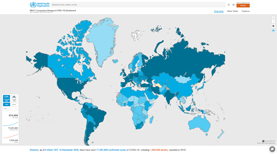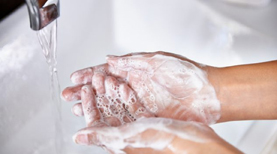In late 2019, a novel coronavirus, now designated severe acute respiratory syndrome coronavirus 2 (SARS-CoV-2), was identified as the cause of an outbreak of acute respiratory illness in Wuhan, China. In February 2020, the World Health Organization (WHO) designated the disease COVID-19, which stands for coronavirus disease 2019. Since the first reports of COVID-19, infection has spread worldwide, with almost 100 million confirmed cases.
Taking the vaccine can help decrease the risk of getting COVID-19.
All COVID-19 vaccines under development will be carefully evaluated in clinical trials and will be approved for sale only if taking them greatly reduces your chances of contracting COVID-19. Clinical trial data confirm that even if you do get novel coronavirus, the vaccine can help you avoid serious illness; vaccination can also protect you and those around you.
COVID-19 vaccination is a safer way to help build protection
Suffering from COVID-19 may provide some natural protection, called natural immunity. Current evidence suggests that within 90 days of the initial infection, it is rare to be re-infected with the virus that caused COVID-19. However, experts are not sure how long this protection will last, and the risk of serious illness and death from COVID-19 far outweighs any of the benefits of innate immunity. Vaccination against COVID-19 can reduce the risk of the disease by producing antibodies. Both natural immunity and immunity from vaccination are important components of preventing the contraction of COVID-19.
Vaccination will be an important way to help stop the pandemic
Wearing a mask and keeping a distance can help reduce your chances of being exposed to the virus or spreading it to others, but these measures are not enough. The vaccine will be used in conjunction with your immune system, so if you are exposed, it will be ready to fight the virus.
● Healthcare Personnel
●Frontline essential workers such as customs inspection and quarantine personnel at ports involved in imported cold chain items
● Port loading and unloading, handling, transportation and other related personnel.
●People with a higher risk of infection such as international transportation and logistics
According to the data of clinical trials that have been carried out, the following populations are temporarily excluded from the scope of this vaccination:
Those who are allergic to any component of the vaccine, have had a severe allergic reaction to vaccines in the past (such as allergic shock, acute allergic reaction, measles, skin eczema, dyspnea, angioedema or abdominal pain)
People suffering from acute illness, severe chronic illness, and acute onset of chronic illness and fever
What are the possible adverse reactions?
Common adverse reactions:
●Generally within 24 hours after vaccination, the injection area may have pain, tenderness, redness, and itching, in most cases, these symptoms will likely disappear on their own within 2 to 3 days.
● Fever, fatigue, will likely disappear on its own after a short period of time and without treatment
The basic immunization is 2 doses, 0.5 ml each, with an interval of 2 to 4 weeks between each dose of intramuscular injection.
Viral mutation is a scientific problem, and the scientific research team in China has been paying close attention to the issue. It includes more than 30 scientific research institutions across the country that carry out the tracking and research of the mutation, and provides timely analyze and assessment of whether the mutation will affect vaccine research and development.
Up to now, there are nearly 150,000 new coronavirus genome sequences in the global database. Through comparative analysis of more than 80,000 high-quality viral genome sequences, the results show that the virus has little variation and belongs to the accumulation of variation within the normal range. Therefore, the current mutation will not have a substantial impact on vaccine development. The scientific research team will closely follow the virus mutation and make timely judgments.
▪Wearing a mask
▪Staying at least six feet (2 meters) away from others
▪Avoiding crowds
▪Washing hands with soap and water for 20 seconds or using hand sanitizer with at least 60% alcohol
▪Following quarantine guidance after exposure to COVID-19
The COVID-19 vaccine is currently only available through the Chinese CDC, but be sure to follow Jiahui on WeChat to see the latest updates on its availability.













